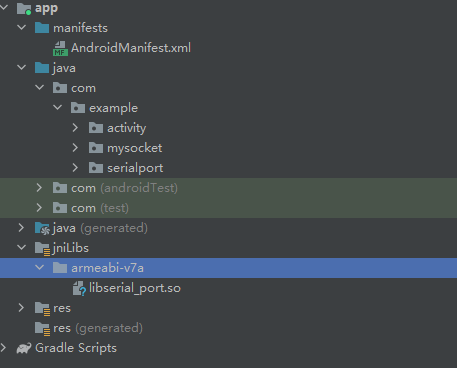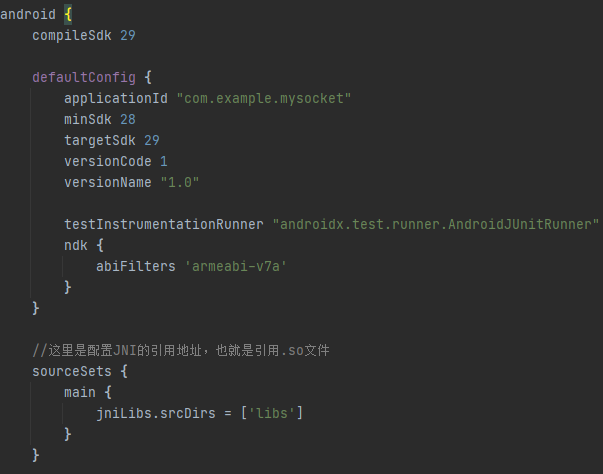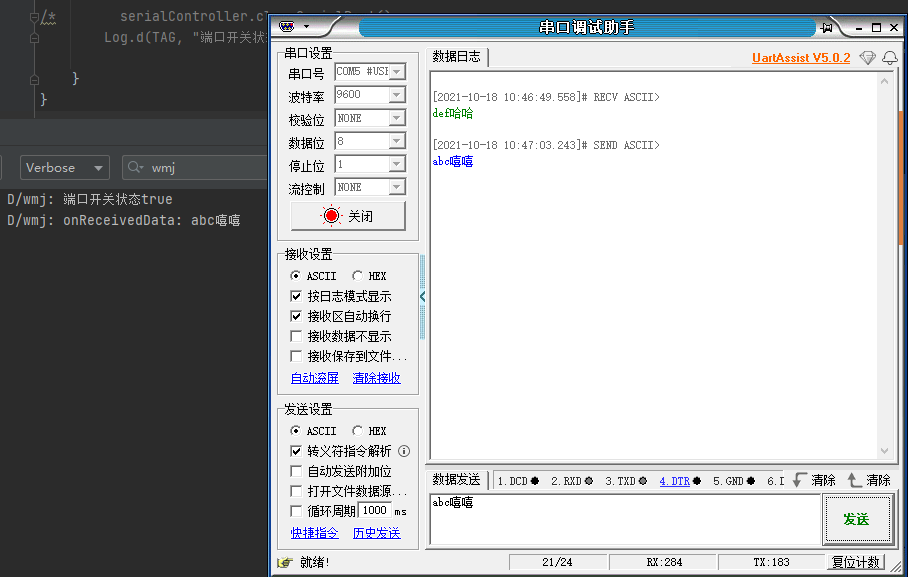串口开发
串口开发
串口开发
编译so文件和项目配置
google串口api下载https://github.com/cepr/android-serialport-api
- 修改android-serialport-api-master\android-serialport-api-master\android-serialport-api\project\jni目录下的Android.mk、Application.mk和SerialPort.c文件
- Android.mk修改解决==libserial_port.so: has text relocations异常==
1
2
3
4
5
6
7
8
9
10
11
12
13
14
#当前文件夹
LOCAL_PATH := $(call my-dir)
include $(CLEAR_VARS)
#目标版本
TARGET_PLATFORM := android-29
#要生成的module
LOCAL_MODULE := serial_port
LOCAL_SRC_FILES := SerialPort.c
LOCAL_LDLIBS := -llog
#加上此句
LOCAL_LDFLAGS += -fPIC
include $(BUILD_SHARED_LIBRARY)
原因在于加载的so库需要重定位, Android 6.0及更高版本已明文禁止此种情形发生。在Android 6.0之前,text reloactions的问题,会在编译的过程中,作为warning报出来;在Android 6.0以上版本,升级为error了。
- Application.mk修改
1
APP_ABI := armeabi-v7a
- SerialPort.c修改解决==java.lang.UnsatisfiedLinkError: No implementation found for java.io.FileDescriptor com.example.serialport.SerialPort.open(java.lang.String, int, int) (tried Java_com_example_serialport_SerialPort_open and Java_com_example_serialport_SerialPort_open__Ljava_lang_String_2II)异常==
1
2
3
4
5
6
7
8
9
10
11
12
13
14
15
16
17
18
19
20
21
22
23
24
25
26
27
28
29
30
31
32
33
34
35
36
37
38
39
40
41
42
43
44
45
46
47
48
49
50
51
52
53
54
55
56
57
58
59
60
61
62
63
64
65
66
67
68
69
70
71
72
73
74
75
76
77
78
79
80
81
82
83
84
85
86
87
88
89
90
91
92
93
94
95
96
97
98
99
100
101
102
103
104
105
106
107
108
109
110
111
112
113
114
115
116
117
118
119
120
121
122
123
124
125
126
127
128
129
130
131
132
133
134
135
136
137
138
139
140
141
142
143
144
#include <termios.h>
#include <unistd.h>
#include <sys/types.h>
#include <sys/stat.h>
#include <fcntl.h>
#include <string.h>
#include <jni.h>
#include "SerialPort.h"
#include "android/log.h"
static const char *TAG="serial_port";
#define LOGI(fmt, args...) __android_log_print(ANDROID_LOG_INFO, TAG, fmt, ##args)
#define LOGD(fmt, args...) __android_log_print(ANDROID_LOG_DEBUG, TAG, fmt, ##args)
#define LOGE(fmt, args...) __android_log_print(ANDROID_LOG_ERROR, TAG, fmt, ##args)
static speed_t getBaudrate(jint baudrate)
{
switch(baudrate) {
case 0: return B0;
case 50: return B50;
case 75: return B75;
case 110: return B110;
case 134: return B134;
case 150: return B150;
case 200: return B200;
case 300: return B300;
case 600: return B600;
case 1200: return B1200;
case 1800: return B1800;
case 2400: return B2400;
case 4800: return B4800;
case 9600: return B9600;
case 19200: return B19200;
case 38400: return B38400;
case 57600: return B57600;
case 115200: return B115200;
case 230400: return B230400;
case 460800: return B460800;
case 500000: return B500000;
case 576000: return B576000;
case 921600: return B921600;
case 1000000: return B1000000;
case 1152000: return B1152000;
case 1500000: return B1500000;
case 2000000: return B2000000;
case 2500000: return B2500000;
case 3000000: return B3000000;
case 3500000: return B3500000;
case 4000000: return B4000000;
default: return -1;
}
}
// 此处修改成对应的java包名com.example.serialport
JNIEXPORT jobject JNICALL Java_com_example_serialport_SerialPort_open
(JNIEnv *env, jclass thiz, jstring path, jint baudrate, jint flags)
{
int fd;
speed_t speed;
jobject mFileDescriptor;
/* Check arguments */
{
speed = getBaudrate(baudrate);
if (speed == -1) {
/* TODO: throw an exception */
LOGE("Invalid baudrate");
return NULL;
}
}
/* Opening device */
{
jboolean iscopy;
const char *path_utf = (*env)->GetStringUTFChars(env, path, &iscopy);
LOGD("Opening serial port %s with flags 0x%x", path_utf, O_RDWR | flags);
fd = open(path_utf, O_RDWR | flags);
LOGD("open() fd = %d", fd);
(*env)->ReleaseStringUTFChars(env, path, path_utf);
if (fd == -1)
{
/* Throw an exception */
LOGE("Cannot open port");
/* TODO: throw an exception */
return NULL;
}
}
/* Configure device */
{
struct termios cfg;
LOGD("Configuring serial port");
if (tcgetattr(fd, &cfg))
{
LOGE("tcgetattr() failed");
close(fd);
/* TODO: throw an exception */
return NULL;
}
cfmakeraw(&cfg);
cfsetispeed(&cfg, speed);
cfsetospeed(&cfg, speed);
if (tcsetattr(fd, TCSANOW, &cfg))
{
LOGE("tcsetattr() failed");
close(fd);
/* TODO: throw an exception */
return NULL;
}
}
/* Create a corresponding file descriptor */
{
jclass cFileDescriptor = (*env)->FindClass(env, "java/io/FileDescriptor");
jmethodID iFileDescriptor = (*env)->GetMethodID(env, cFileDescriptor, "<init>", "()V");
jfieldID descriptorID = (*env)->GetFieldID(env, cFileDescriptor, "descriptor", "I");
mFileDescriptor = (*env)->NewObject(env, cFileDescriptor, iFileDescriptor);
(*env)->SetIntField(env, mFileDescriptor, descriptorID, (jint)fd);
}
return mFileDescriptor;
}
// 此处修改成对应的java包名com.example.serialport
JNIEXPORT void JNICALL Java_com_example_serialport_SerialPort_close
(JNIEnv *env, jobject thiz)
{
jclass SerialPortClass = (*env)->GetObjectClass(env, thiz);
jclass FileDescriptorClass = (*env)->FindClass(env, "java/io/FileDescriptor");
jfieldID mFdID = (*env)->GetFieldID(env, SerialPortClass, "mFd", "Ljava/io/FileDescriptor;");
jfieldID descriptorID = (*env)->GetFieldID(env, FileDescriptorClass, "descriptor", "I");
jobject mFd = (*env)->GetObjectField(env, thiz, mFdID);
jint descriptor = (*env)->GetIntField(env, mFd, descriptorID);
LOGD("close(fd = %d)", descriptor);
close(descriptor);
}
- 在jni目录下执行ndk-build命令生成新的so文件
- 添加到项目中
- gradle中添加引用
1
2
3
4
5
6
//这里是配置JNI的引用地址,也就是引用.so文件
sourceSets {
main {
jniLibs.srcDirs = ['libs']
}
}
1
2
3
ndk {
abiFilters 'armeabi-v7a'
}
代码
- SerialPort.java
1
2
3
4
5
6
7
8
9
10
11
12
13
14
15
16
17
18
19
20
21
22
23
24
25
26
27
28
29
30
31
32
33
34
35
36
37
38
39
40
41
42
43
44
45
46
47
48
49
50
51
52
53
54
55
56
57
58
59
60
61
62
63
64
65
66
67
68
69
70
71
72
73
74
75
76
77
78
79
80
81
82
83
84
85
86
87
88
89
90
91
92
93
94
95
96
package com.example.serialport;
import android.util.Log;
import java.io.File;
import java.io.FileDescriptor;
import java.io.FileInputStream;
import java.io.FileOutputStream;
import java.io.IOException;
import java.io.InputStream;
import java.io.OutputStream;
/**
* Google官方代码
* 此类的作用为,JNI的调用,用来加载.so文件的
* 获取串口输入输出流
*/
public class SerialPort {
private static final String TAG = "SerialPort";
private FileDescriptor mFd; // 文件描述
private FileInputStream mFileInputStream;
private FileOutputStream mFileOutputStream;
/**
* @param device 要操作的文件对象
* @param baudrate 波特率
* @param flags 文件操作的标志
* @throws SecurityException
* @throws IOException
*/
public SerialPort(File device, int baudrate, int flags)
throws SecurityException, IOException {
// 检查权限
if (!device.canRead() || !device.canWrite()) {
try {
// 如果丢失权限,就再获取权限
Process su;
su = Runtime.getRuntime().exec("/system/xbin/su");
String cmd = "root chmod 666 " + device.getAbsolutePath() + "\n"
+ "exit\n";
// 写命令
su.getOutputStream().write(cmd.getBytes());
if ((su.waitFor() != 0) || !device.canRead()
|| !device.canWrite()) {
throw new SecurityException();
}
} catch (Exception e) {
e.printStackTrace();
throw new SecurityException();
}
}
System.out.println(device.getAbsolutePath() + "==============================");
// 打开设备,这里面调用jni 的open方法,开启串口,传入物理地址、波特率、flags值
mFd = open(device.getAbsolutePath(), baudrate, flags);
if (mFd == null) {
Log.e(TAG, "native open returns null");
throw new IOException();
}
mFileInputStream = new FileInputStream(mFd);
mFileOutputStream = new FileOutputStream(mFd);
}
// 获取串口的输入流
public InputStream getInputStream() {
return mFileInputStream;
}
// 获取串口的输出流
public OutputStream getOutputStream() {
return mFileOutputStream;
}
/**
* 打开串口设备的方法
*
* @param path 设备的绝对路径
* @param baudrate 波特率
* @param flags 标志
* @return
*/
// JNI调用,开启串口
private native static FileDescriptor open(String path, int baudrate, int flags);
// 关闭串口
public native void close();
static {
// 加载库文件.so文件
System.loadLibrary("serial_port");
}
}
- SerialController.java
1
2
3
4
5
6
7
8
9
10
11
12
13
14
15
16
17
18
19
20
21
22
23
24
25
26
27
28
29
30
31
32
33
34
35
36
37
38
39
40
41
42
43
44
45
46
47
48
49
50
51
52
53
54
55
56
57
58
59
60
61
62
63
64
65
66
67
68
69
70
71
72
73
74
75
76
77
78
79
80
81
82
83
84
85
86
87
88
89
90
91
92
93
94
95
96
97
98
99
100
101
102
103
104
105
106
107
108
109
110
111
112
113
114
115
116
117
118
119
120
121
122
123
124
125
126
127
128
129
130
131
132
133
134
135
136
137
138
139
140
141
142
143
144
145
146
147
148
149
150
151
152
153
154
155
package com.example.serialport;
import java.io.File;
import java.io.IOException;
import java.io.InputStream;
import java.io.OutputStream;
import java.util.ArrayList;
import java.util.Arrays;
import java.util.List;
import java.util.concurrent.ExecutorService;
import java.util.concurrent.Executors;
public class SerialController {
private ExecutorService mThreadPoolExecutor = Executors.newCachedThreadPool();
private InputStream inputStream;
private OutputStream outputStream;
private boolean isOpened = false;
private OnSerialListener mOnSerialListener;
/**
* 获取所有串口路径
*
* @return 串口路径集合
*/
public List<String> getAllSerialPortPath() {
SerialPortFinder mSerialPortFinder = new SerialPortFinder();
String[] deviceArr = mSerialPortFinder.getAllDevicesPath();
return new ArrayList<>(Arrays.asList(deviceArr));
}
/**
* 打开串口
*
* @param serialPath 串口地址
* @param baudRate 波特率
* @param flags 标志位
* O_RDONLY 以只读方式打开文件O_WRONLY 以只写方式打开文件O_RDWR 以可读写方式打开文件
*/
public void openSerialPort(String serialPath, int baudRate, int flags) {
try {
SerialPort serialPort = new SerialPort(new File(serialPath), baudRate, flags);
inputStream = serialPort.getInputStream();
outputStream = serialPort.getOutputStream();
isOpened = true;
if (mOnSerialListener != null) {
mOnSerialListener.onSerialOpenSuccess();
}
mThreadPoolExecutor.execute(new ReceiveDataThread());
} catch (Exception e) {
if (mOnSerialListener != null) {
mOnSerialListener.onSerialOpenException(e);
}
}
}
/**
* 关闭串口
*/
public void closeSerialPort() {
try {
if (inputStream != null) {
inputStream.close();
}
if (outputStream != null) {
outputStream.close();
}
isOpened = false;
} catch (IOException e) {
e.printStackTrace();
}
}
/**
* 发送串口数据
*
* @param bytes 发送数据
*/
public void sendSerialPort(byte[] bytes) {
if (!isOpened) {
return;
}
try {
if (outputStream != null) {
outputStream.write(bytes);
outputStream.flush();
}
} catch (IOException e) {
e.printStackTrace();
}
}
/**
* 返回串口是否开启
*
* @return 是否开启
*/
public boolean isOpened() {
return isOpened;
}
/**
* 串口返回数据内容读取
*/
private class ReceiveDataThread extends Thread {
@Override
public void run() {
super.run();
while (isOpened) {
if (inputStream != null) {
byte[] readData = new byte[1024];
try {
int size = inputStream.read(readData);
if (size > 0) {
if (mOnSerialListener != null) {
mOnSerialListener.onReceivedData(readData, size);
}
}
} catch (Exception e) {
e.printStackTrace();
}
}
}
}
}
/**
* 设置串口监听
*
* @param onSerialListener 串口监听
*/
public void setOnSerialListener(OnSerialListener onSerialListener) {
this.mOnSerialListener = onSerialListener;
}
/**
* 串口监听
*/
public interface OnSerialListener {
/**
* 串口数据返回
*/
void onReceivedData(byte[] data, int size);
/**
* 串口打开成功
*/
void onSerialOpenSuccess();
/**
* 串口打开异常
*/
void onSerialOpenException(Exception e);
}
}
- 测试类SerialPortUtil.java
1
2
3
4
5
6
7
8
9
10
11
12
13
14
15
16
17
18
19
20
21
22
23
24
25
26
27
28
29
30
31
32
33
34
35
36
37
38
39
40
41
42
43
44
45
46
47
48
49
50
51
package com.example.serialport;
import android.util.Log;
import java.nio.charset.StandardCharsets;
import java.util.List;
public class SerialPortUtil {
private static final String TAG = "xxx";
private SerialController serialController;
public void fun() {
// 获取串口
serialController = new SerialController();
List<String> serialPortPaths = serialController.getAllSerialPortPath();
// 没有/dev/ttyHS1串口就返回
if (!serialPortPaths.contains("/dev/ttyHS1")) return;
// 打开串口 参数三是读写方式:1:O_RDONLY以只读方式打开文件 2:O_WRONLY以只写方式打开文件 3:O_RDWR以可读写方式打开文件
serialController.openSerialPort("/dev/ttyHS1", 9600, 2);
Log.d(TAG, "端口开关状态" + serialController.isOpened());
// 设置监听
serialController.setOnSerialListener(new SerialController.OnSerialListener() {
@Override
public void onReceivedData(byte[] data, int size) {
// 取data中size大小的数组
String s = new String(data, 0, size, StandardCharsets.UTF_8);
Log.d(TAG, "onReceivedData: " + s);
}
@Override
public void onSerialOpenSuccess() {
Log.d(TAG, "onSerialOpenSuccess: ");
}
@Override
public void onSerialOpenException(Exception e) {
Log.d(TAG, "onSerialOpenException: " + e);
}
});
// 发送数据
serialController.sendSerialPort("def哈哈".getBytes(StandardCharsets.UTF_8));
/* serialController.closeSerialPort();
Log.d(TAG, "端口开关状态" + serialController.isOpened());*/
}
}
本文由作者按照 CC BY 4.0 进行授权



